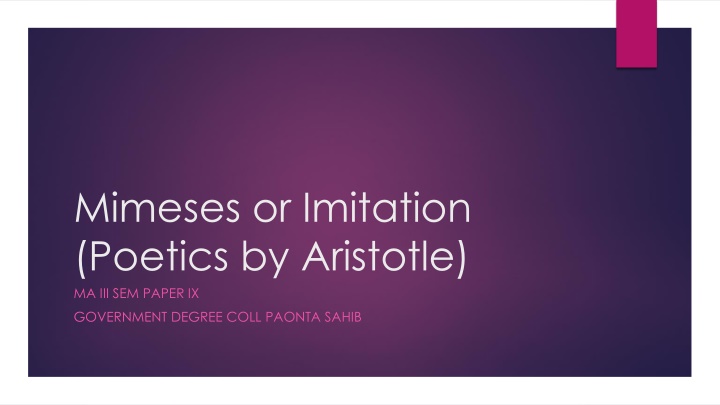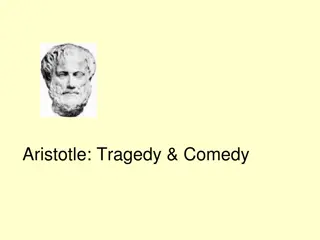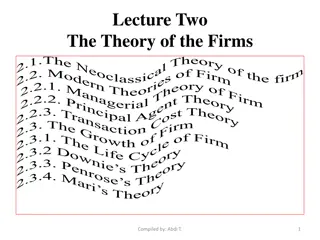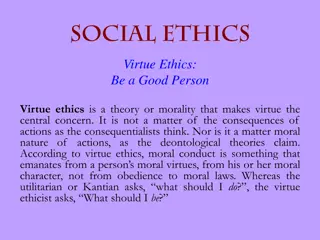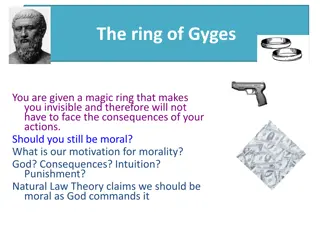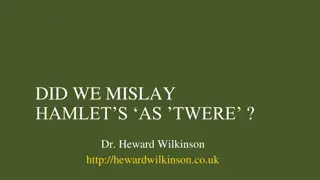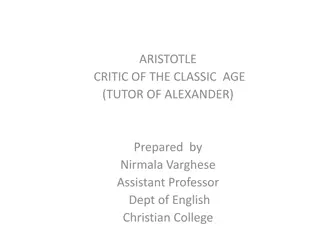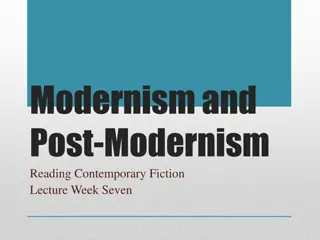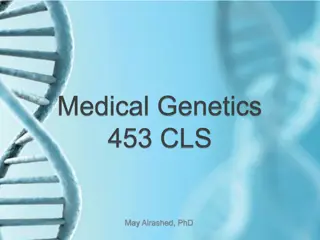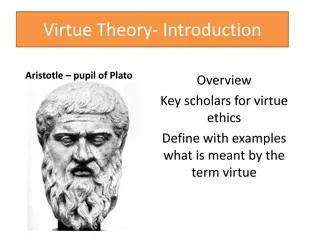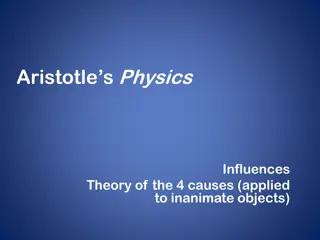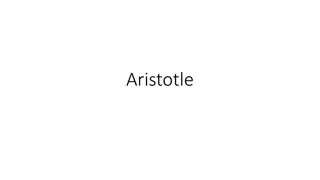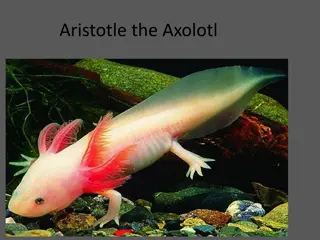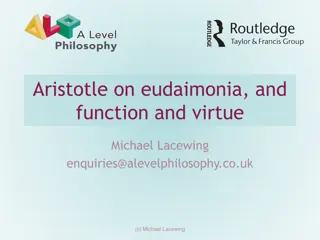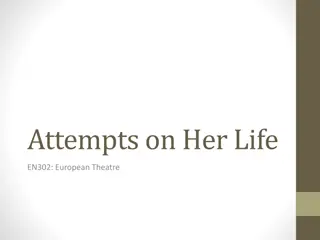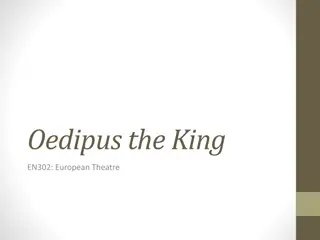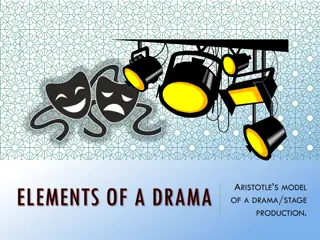The Theory of Mimesis in Aristotle's Poetics
Aristotle's theory of mimesis, outlined in his work "Poetics," contrasts with Plato's view by emphasizing that art imitates nature. He believes that poetry expresses the universal while history narrates the particular, highlighting the poet's freedom from factual constraints to explore larger truths. By discussing tragedy as imitation of human action, Aristotle demonstrates how various forms of poetry mimic reality through rhythm, language, and melody. This discussion explores the essence of mimesis in art and its significance in philosophical context.
Download Presentation

Please find below an Image/Link to download the presentation.
The content on the website is provided AS IS for your information and personal use only. It may not be sold, licensed, or shared on other websites without obtaining consent from the author.If you encounter any issues during the download, it is possible that the publisher has removed the file from their server.
You are allowed to download the files provided on this website for personal or commercial use, subject to the condition that they are used lawfully. All files are the property of their respective owners.
The content on the website is provided AS IS for your information and personal use only. It may not be sold, licensed, or shared on other websites without obtaining consent from the author.
E N D
Presentation Transcript
Mimeses or Imitation (Poetics by Aristotle) MA III SEM PAPER IX GOVERNMENT DEGREE COLL PAONTA SAHIB
History History tells us what actually happened; poetry what may happen. Poetry tends to express the universal, history the particular. In this way, he exhibits the superiority of poetry over history. The poet freed from the tyranny of facts, takes a larger or general view of things, represents the universal in the particular and so shares the philosopher's quest for ultimate truth. He thus equates poetry with philosophy and shows that both are means to a higher truth. By the word 'universal' Aristotle signifies:
1.What is the "Theory of Mimesis"?- Aristotle Vs PlatoPlato's Theory of Mimesis Plato says that all art is mimetic by nature art is an imitation of life. He believed that 'idea' is the ultimate reality. ... He gives first importance to philosophy as philosophy deals with the ideas whereas poetry deals with illusion things which are twice removed from reality. Aristotle's Theory of Mimesis Mimesis, basic theoretical principle in the creation of art. The word is Greek and means imitation (though in the sense of re-presentation rather than of copying). ... Aristotle, speaking of tragedy, stressed the point that it was an imitation of an actionthat of a man falling from a higher to a lower estate.
1.What is the "Theory of Mimesis"?- Aristotle Vs PlatoPlato's Theory of Mimesis Plato says that all art is mimetic by nature art is an imitation of life. He believed that 'idea' is the ultimate reality. ... He gives first importance to philosophy as philosophy deals with the ideas whereas poetry deals with illusion things which are twice removed from reality. Aristotle's Theory of Mimesis Mimesis, basic theoretical principle in the creation of art. The word is Greek and means imitation (though in the sense of re-presentation rather than of copying). ... Aristotle, speaking of tragedy, stressed the point that it was an imitation of an actionthat of a man falling from a higher to a lower estate.
Elsewhere Aristotle says, "Art imitates Nature". By 'Nature' he does not mean the outer world of created things but "the creative force, the productive principle of the universe." Art reproduce mainly an inward process, a physical energy working outwards, deeds, incidents, situation, being included under it so far as these spring from an inward, act of will, or draw some activity of thought or feeling. He renders men, "as they ought to be
Aristotle argues that all forms of poetrytragedy, epic poetry, comedy, dithyrambic poetry and dance; and music performed by pipe or lyre are forms of imitation and can only differ three ways: their medium, their object, and their mode of imitation. In all poetry, Aristotle says, the medium of imitation is rhythm, language and melody, and different types of poetic expression employ these mediums separately or together in some combination.
According to Aristotle, imitation comes naturally to human beings from childhood. This is how humans are different from animals, Aristotle says, as people learn through imitation and have a strong inclination to imitate people and things
Aristotle by his theory of imitation answers the charge of Plato that poetry is an imitation of "shadow of shadows", thrice removed from truth, and that the poet beguiles us with lies. Plato condemned poetry that in the very nature of things poets have no idea of truth. The phenomenal world is not the reality but a copy of the reality in the mind of the Supreme. The poet imitates the objects and phenomena of the world, which are shadowy and unreal. Poetry is, therefore, "the mother of lies"
The medium of the poet and the painter are different. One imitates through form and colour, and the other through language, rhythm and harmony. The musician imitates through rhythm and harmony. Thus, poetry is more akin to music. Further, the manner of a poet may be purely narrative, as in the Epic, or depiction through action, as in drama. Even dramatic poetry is differentiated into tragedy and comedy accordingly as it imitates man as better or worse.
Aristotle says that the objects of poetic imitation are "men in action". The poet represents men as worse than they are. He can represent men better than in real life based on material supplied by history and legend rather than by any living figure. The poet selects and orders his material and recreates reality. He brings order out of Chaos. The irrational or accidental is removed and attention is focused on the lasting and the significant. Thus he gives a truth of an ideal kind. His mind is not tied to reality:
Aristotle by his theory of imitation answers the charge of Plato that poetry is an imitation of "shadow of shadows", thrice removed from truth, and that the poet beguiles us with lies. Plato condemned poetry that in the very nature of things poets have no idea of truth. The phenomenal world is not the reality but a copy of the reality in the mind of the Supreme. The poet imitates the objects and phenomena of the world, which are shadowy and unreal. Poetry is, therefore, "the mother of lies"
